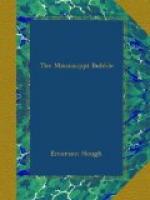“In effect,” said the regent, smiling, “you promise me that you can build a new Paris, a new world! Yet much of this I can in part believe and understand. Let that be as it may. The immediate truth is that something must be done, and done at once.”
“Obviously.”
“Our public debt is twenty-six hundred millions of livres. Its annual interest is eighty millions of livres. We can not pay this interest alone, not to speak of the principal. Obviously, as you say, the matter admits of no delay. Your bank—why, by heaven, let us have your bank! What can we do without your bank? Lastly, how quickly can we have it?”
“Sire, you make me the happiest man in all the world!”
“The advantage is quite otherwise, sir. But my head already swims with figures. Now let us set the rest aside until to-morrow. Meantime, I must confess to you, my dear friend, there is somewhat else that sits upon my mind.”
A change came upon the demeanor of his Grace the regent. Laying aside the dignity of the ruler with the questions of state, he became again more nearly that Philippe of Orleans, known by his friends as gay, care free and full of camaraderie.
“Your Grace, could I be of the least personal service, I should be too happy,” said Law.
“Well, then, I must admit to you that this is a question of a diamond.”
“Oh, a diamond?”
“The greatest diamond in the world. Indeed, there is none other like it, and never will be. This Jew hounds me to death, holding up the thing before mine eyes. Even Saint Simon, that priggish little duke of ours, tells me that France should have this stone, that it is a dignity which should not be allowed to pass away from her. But how can France, bankrupt as she is, afford a little trifle which costs three million francs? Three million francs, when we can not pay eighty millions annual interest on our debts!”
“’Tis as you say, somewhat expensive,” said Law.
“Naturally, for I say to you that this stone had never parallel in the history of the world. It seems that this overseer in the Golconda mines got possession of it in some fashion, and escaped to Europe, hiding the stone about his person. It has been shown in different parts of Europe, but no one yet has been able to meet the price of this extortioner who owns it.”
“And yet, as Saint Simon says, there is no dignity too great for the throne of France.”
“Yet, meantime, the king will have no use for it for several years to come. There is the Sancy stone—”
“And, as your Grace remembers, this new stone would look excellent well upon a woman?” said Law. He gazed, calm and unsmiling, directly into the eyes of Philippe of Orleans.
“Monsieur L’as, you have the second sight!” cried the latter, unblushingly. “You have genius. May God strike me blind if ever I have seen a keener mind than thine!”
“All warm blood is akin,” replied John Law. “This stone is perhaps for your Grace’s best beloved?”




